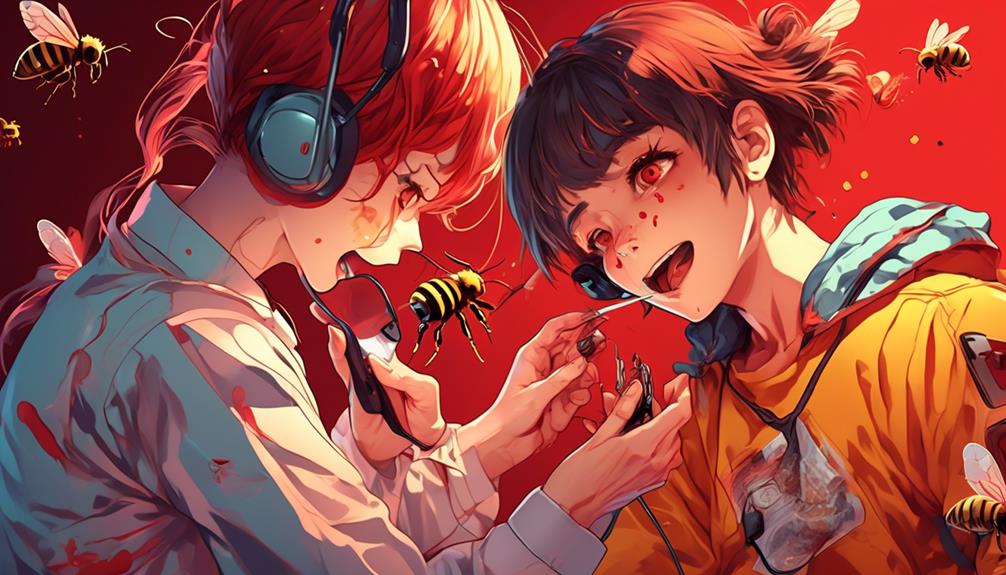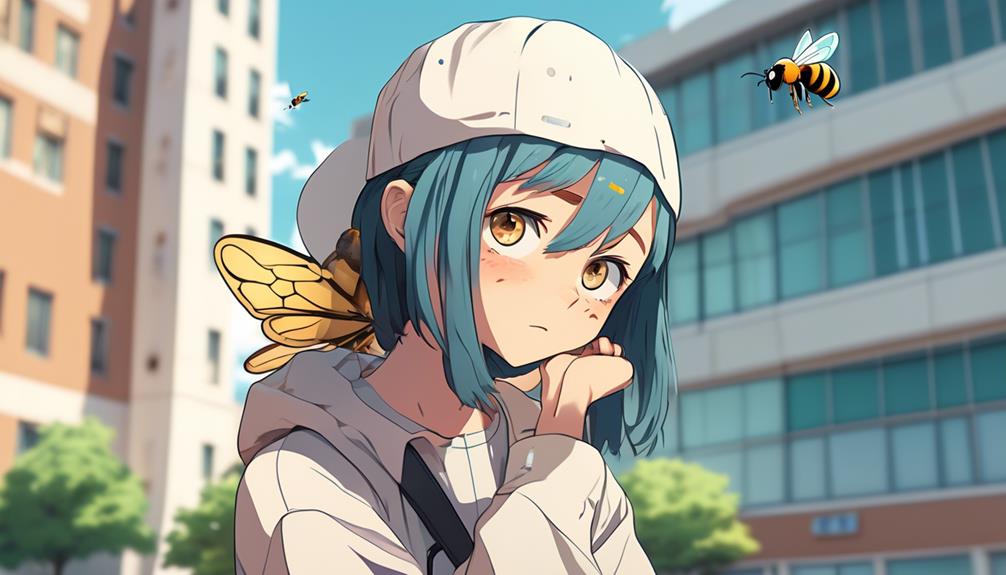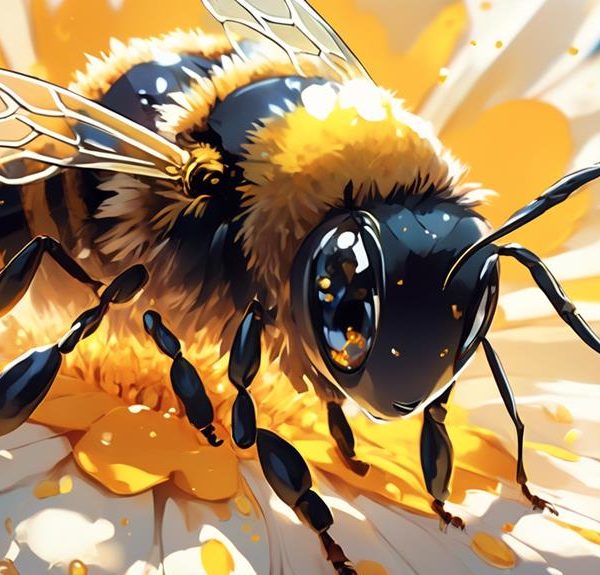Peek into the world of bee allergies; distinguishing normal reactions from dangerous ones could save your life.

How to Know if I'm Allergic to Bees?
If you've ever been stung by a bee, you might feel like you've been shot with a tiny, venomous arrow. While most people experience only temporary discomfort, there's a small percentage of you who could have a serious allergic reaction.
You might be wondering, 'Am I one of those people?' Knowing whether you're allergic to bees isn't as straightforward as you might think. It involves understanding the difference between a normal reaction and an allergic one, recognizing the symptoms, and knowing when to seek medical help.
So, let's get started, shall we?
Key Takeaways
- Bee sting allergies occur when the immune system overreacts to bee venom.
- Symptoms of bee allergies can range from redness, swelling, and itchiness at the sting site to severe reactions like anaphylaxis, which can cause difficulty breathing and low blood pressure.
- Delayed allergic responses can occur hours or days after a bee sting, with symptoms including fever, fatigue, muscle pain, and rash.
- Immediate medical attention is necessary for severe symptoms, especially anaphylaxis, and prompt treatment with epinephrine is crucial to prevent life-threatening allergic reactions.
Understanding Bee Sting Allergies

To grasp bee sting allergies, you must first understand that they occur when your immune system overreacts to the venom in a bee's sting. While most people experience only minor symptoms like pain, redness, and swelling at the sting site, you could experience a severe allergic reaction if your immune system responds excessively. This reaction is called anaphylaxis, a life-threatening condition that requires immediate medical attention.
The venom of a bee contains proteins that can affect your skin cells and immune system, causing pain and swelling around the sting area. For some individuals, the immune system recognizes these proteins as harmful invaders and releases chemicals to defend your body. This release can cause various symptoms such as hives, swelling of the throat and tongue, difficulty breathing, dizziness, stomach cramps, nausea, or diarrhea.
If you've ever been stung by a bee and had these symptoms, you're likely allergic to bee stings. It's essential to seek medical help promptly if you have a bee sting and experience anything more severe than minor swelling and pain. Remember, it's not something you should ignore because each subsequent bee sting could lead to a more severe reaction.
Common Symptoms of Bee Allergies

Recognizing the common symptoms of bee allergies can be crucial in ensuring prompt and appropriate treatment. If you're allergic to bees, you'll likely experience a more severe reaction than a typical sting.
The most common symptoms include redness, swelling, and itchiness at the sting site. These symptoms usually appear quickly after the sting. However, if you're highly allergic, you may experience anaphylaxis, a severe and potentially life-threatening reaction. Symptoms of anaphylaxis include difficulty breathing, swelling of the throat and tongue, a rapid pulse, dizziness, or a sudden drop in blood pressure.
Other symptoms can include nausea, vomiting, diarrhea, stomach cramps, or a red, itchy rash anywhere on your body, not just at the sting site. You may also feel weak or faint.
It's important to note that you mightn't have a severe reaction the first time you're stung. But even a mild initial reaction doesn't mean you'll only have mild reactions in the future. In fact, subsequent reactions could be more severe.
If you experience any of these symptoms, particularly the symptoms of anaphylaxis, seek medical attention immediately. Bee allergies can be serious, but with prompt treatment, most reactions can be managed effectively.
Immediate Reaction: What to Expect

Upon being stung by a bee, you may instantly notice certain reactions that could indicate an allergic response. Immediate symptoms typically occur within minutes of the sting and can range from mild to severe.
Mild reactions can include redness, swelling, and a sharp, burning pain at the sting site. You might also experience itching and warmth around the area. While these signs are common and usually not cause for concern, it's important to monitor them closely.
If you're allergic, however, you may experience more severe reactions. These can involve hives, itching, and swelling affecting parts of the body beyond the sting site. Other symptoms can include difficulty breathing, a sudden drop in blood pressure, dizziness, or even loss of consciousness. This is a life-threatening condition known as anaphylaxis, and it requires immediate medical attention.
Delayed Allergic Responses

While immediate reactions to bee stings can be alarming, it's equally important to be aware of potential delayed allergic responses that mightn't manifest until hours or even days after the incident. These late phase reactions, often a result of your body's immune system continuing to fight the bee venom, can include symptoms such as fever, fatigue, muscle pain, and rash.
In some cases, you may experience serum sickness, a rare but serious condition that typically occurs a week after the sting. Symptoms include joint pain, fever, and rash. Another rare but severe delayed reaction is nephrotic syndrome, which affects the kidneys and can develop within three weeks after the sting.
If you notice any unusual symptoms within a few weeks of a bee sting, it's crucial to see a doctor immediately. They can perform tests to confirm whether you're experiencing a delayed allergic reaction and provide appropriate treatment.
Steps to Take After a Sting

If you've been stung by a bee, it's essential to promptly initiate a series of steps to mitigate the risk of severe allergic reactions and to hasten recovery. The following table provides a simplified guide on what to do immediately after a bee sting:
Step | Action | Explanation |
|---|---|---|
1 | Remove Stinger | Use a credit card or fingernail to scrape it away. Avoid tweezers as they might push more venom into the skin. |
2 | Clean the Area | Wash with soap and water to prevent infection. |
3 | Apply Cold Compress | This reduces swelling and numbs the area. |
4 | Use Pain Relievers | Over-the-counter pain relief can help manage discomfort. |
5 | Monitor Symptoms | If symptoms worsen or if you have a history of bee sting allergies, seek medical help immediately. |
Seeking Medical Attention: When and Why

Despite your best efforts to manage a bee sting at home, there are situations when you'll need to seek medical help to prevent or treat potential severe allergic reactions. Immediate medical attention is crucial if you experience symptoms of anaphylaxis. These can include difficulty breathing, swelling of the throat or tongue, rapid pulse, severe hives, dizziness, or loss of consciousness. This severe allergic reaction can be life-threatening if not treated promptly with epinephrine.
Even if you don't display immediate severe reactions, you should still consider seeking medical advice. Some people develop a delayed reaction to bee stings, which can occur hours or even days after the sting. Symptoms to look out for include increased swelling or redness, warmth around the sting site, pus or discharge indicating an infection, or flu-like symptoms such as fever, fatigue, and body aches.
Frequently Asked Questions
Can Bee Allergies Be Genetically Inherited?"
Yes, you can genetically inherit bee allergies. If your parents or siblings have a bee allergy, you're more likely to have it too. It's not a guarantee, but it increases your risk.
Always remember, though, just because it's in your genes doesn't mean you'll develop it. Other factors, like exposure frequency, can play a role.
It's best to consult a healthcare professional if you're concerned about potential allergies.
Are Certain People More Prone to Develop Bee Allergies?"
Yes, certain people are indeed more prone to developing bee allergies. If you've had a severe reaction to a bee sting in the past, you're more likely to react again.
Also, if your family has a history of bee allergies, you're at a greater risk.
Remember, it's not instantaneous. You can get stung multiple times before an allergy develops.
Can an Allergy to Bees Develop Later in Life?"
Yes, you can develop a bee allergy later in life. It's not uncommon for allergies to appear in adulthood. Your immune system may change over time, causing you to react to bee stings when you didn't before.
If you're stung and experience symptoms like difficulty breathing, hives, or swelling, it's important to seek immediate medical attention. These could be signs of an allergic reaction.
Always consult a healthcare provider if you suspect a bee allergy.
Can Bee Allergies Be Cured or Only Managed?"
Unfortunately, there's no known cure for bee allergies. You can manage them through precautions and treatments.
- It's crucial to avoid bees if you're allergic. Carry an EpiPen in case you're stung.
- Desensitization treatments, or allergy shots, can help reduce your reaction over time. They don't cure the allergy, but they decrease your body's sensitivity to bee venom.
What Other Insects Might I Be Allergic to if I'm Allergic to Bees?"
If you're allergic to bees, you might also react to other stinging insects like wasps, hornets, yellow jackets, and fire ants. This is due to a shared protein in their venom.
However, not everyone allergic to bees reacts to other insects. It's crucial to get tested by an allergist to know your specific allergies.
This helps in managing your reactions effectively and could potentially save your life in a severe allergic reaction situation.
Conclusion
If you're stung by a bee, knowing if you're allergic is vital.
Bee allergies can cause symptoms like swelling, itching, and difficulty breathing.
Immediate reactions are alarming, but delayed responses can be harmful too.
After a sting, clean the area and remove the stinger if possible.
If symptoms worsen, seek medical attention promptly.
Remember, understanding your body's response to bee stings can make all the difference in managing a potential allergy.


